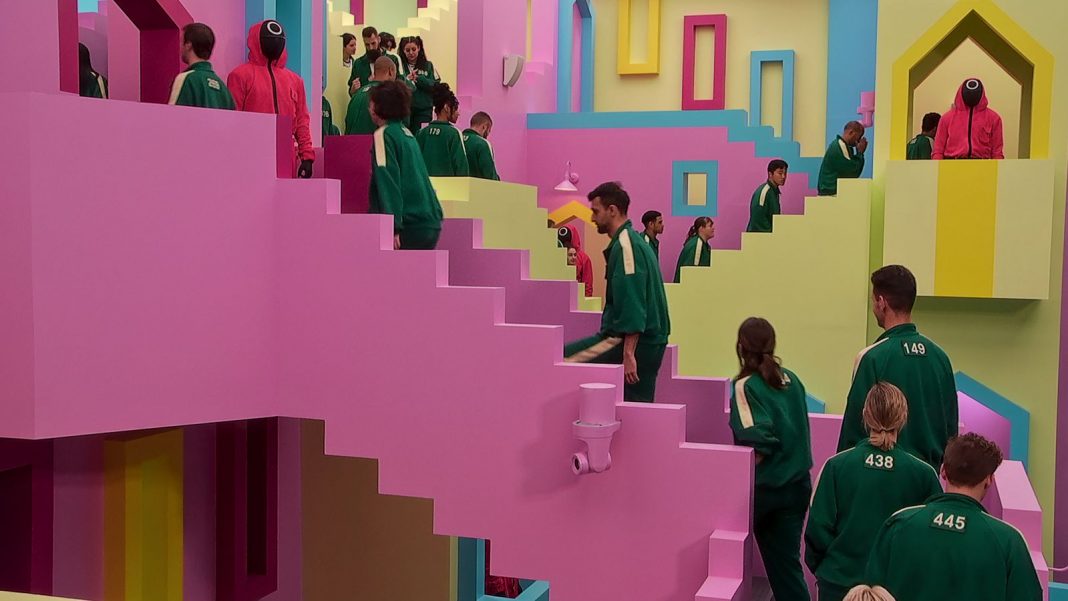Reality TV has undergone plenty of changes in the last decade – from the end of stalwart Noughties shows, the much-needed emphasis on duty of care towards participants, and the genre’s pipeline to social media influencing.
Now Squid Game: The Challenge has landed on our screens and turned trusted formats upside down again.
Some 456 contestants from across the globe compete in children’s games based on Netflix‘s smash-hit South Korean thriller for a $4.56m jackpot (£3.64m) – thought to be the largest single cash prize ever in a television show.
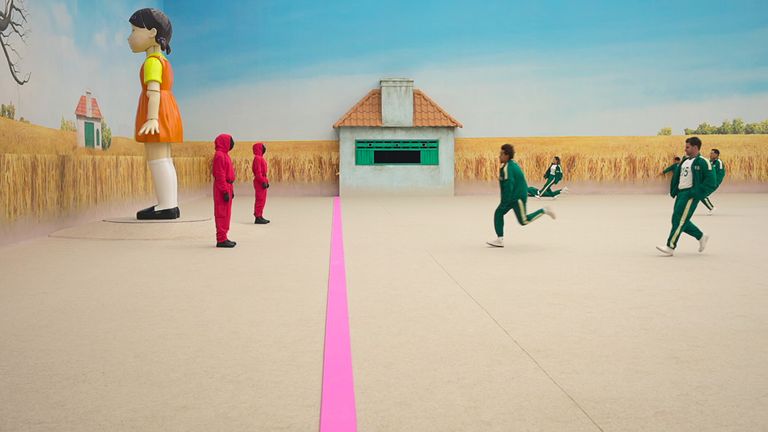
Netflix’s Squid Game: The Challenge Pic: Netflix
From the start, the show proved controversial after three contestants received medical treatment after the game Red Light, Green Light was filmed in Bedfordshire during a cold snap in January.
Executive producer Tim Harcourt, creative director at Studio Lambert, said the team had taken “all the appropriate measures” before filming.
“Some people anonymously were disgruntled and annoyed that they had spent a lot of time playing that game in the cold and then were eliminated. And that’s understandable.”
But he says the challenging conditions were to be expected with such a massive jackpot.
“It is $4.56 million and Netflix is never just going to give that away easily.”
And with such a massive prize comes massive responsibility for the producers.
John Hay, chief executive of The Garden production company, said the team was “absolutely scrupulous – doubly so, given the size of the prize, about judging who moved and who hadn’t [in the Red Light, Green Light game].
“We had a whole team of adjudicators behind the scenes,” he said.
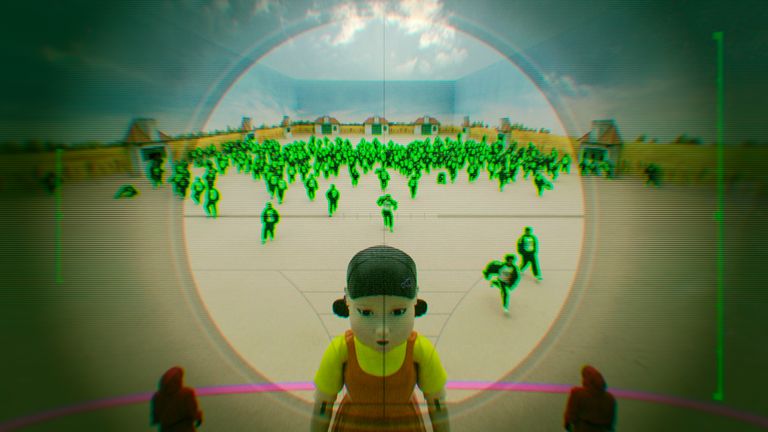
The Red Light, Green Light game Pic: Netflix
“These were people independent of us from a different company, trained lawyers, who would check those movements and we had those people with us all the way through the entire series.”
Hay said the jackpot prize was one of the most significant decisions that Netflix made about the show because “it just flips the whole thing”.
“Instead of being driven by the fear of death, it’s driven by the sort of scale of this opportunity.
“It turns out that’s just as powerful a motor for stories as in the drama. The people who went into that set lived in these six soundstages. The ones who made it to the finals were there for 16 days.
“They were chasing this huge prize. It felt like the stakes felt suitably high. And I think that drove some of the reactions to it in the course of the game,” Hay said.

The contestants’ dorm Pic: Netflix
And those reactions were sometimes powerful. The show feels more extreme and more challenging than any recent reality show game. One contestant appeared to be close to vomiting from the pressure of making a decision that would ultimately lead to his elimination.
“We had to accept that that immersion [in the game] would put people under quite a lot of pressure and it could be stressful. And that’s something that we would talk about [with contestants],” Harcourt said.
“We really take care as they exit the game to chat to them and allow them to process everything that they felt and to realise that it’s all fine now and that was a game and they were playing under pressure.
“Those are conversations that continue with the contributors not just straight after the game, but six months after,” Harcourt said, adding that the show’s welfare team is in touch with the contestants now as the show is airing.
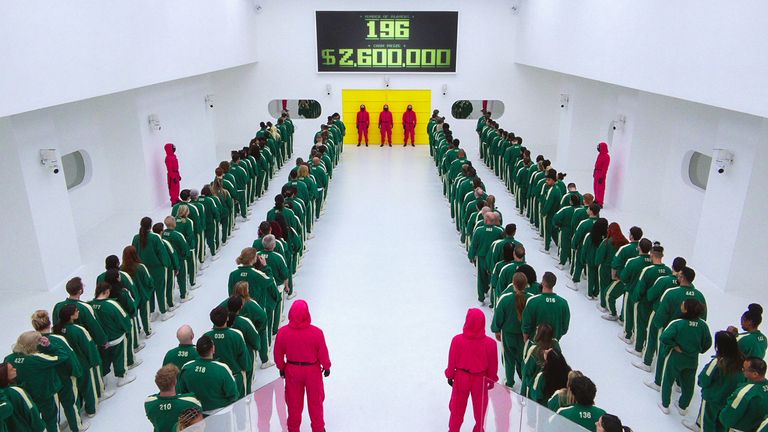
A scene from Squid Game: The Challenge Pic: Netflix
Squid Game remains the most popular Netflix series of all time and was streamed by 111 million users in the first 28 days after its release in September 2021.
Hay, whose company The Garden has created shows such as 24 Hours in A&E and Emergency, said Squid Game’s success was both a blessing and a burden.
“Starting from a drama as brilliant and as successful as Squid Game is a huge head start in that there’s already a huge number of people interested and it’s very unusual in being a drama that’s based around a game.
“It’s an ingeniously designed game. There’s a real singularity and originality of the vision in the drama. There’s a world [with] a very distinctive sort of tone and visual style.
“But in another sense, it sets the bar unbelievably high. We knew that we had to match the world. We had to play in the spirit of the game.”
The number of contestants was also a huge logistical challenge. More than 80,000 people applied to be on the show with Hay saying it was a “mammoth task” to whittle it down to just 456 contestants.
“Of course, without a script, we had to find ways of creating the conditions in which some of those dynamics [of the drama] could play out without being able to actually know who our heroes were from the start and then write their storylines,” Hay said.
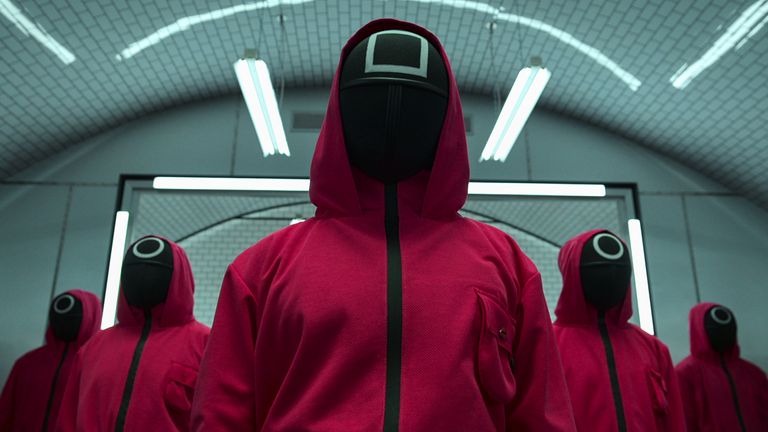
Netflix’s Squid Game: The Challenge Pic: Netflix
Harcourt, who has produced other reality shows including The Traitors, The Circle and Naked Attraction, said filming the 456 contestants was “the biggest creative challenge” of the show.
Another challenge was how to eliminate people from the game. In the drama, contestants are immediately killed which led to some creative discussions as to how to adapt it for the reality TV show.
“Quite early on we came upon the idea of the dye pack, which is something that every contestant wore underneath their white t-shirt,” Harcourt said.
“We arrived at black ink. There was a taste issue with blood.”
“We went through a lot of testing to get the dye colour right, the type of dye right. Even the nozzle that sprays the ink out through their T-shirt had to have such a force that it would actually show on that T-shirt and also that they would actually feel it go off so that everybody knew that they were out of the game.”
This content is provided by Spreaker, which may be using cookies and other technologies.
To show you this content, we need your permission to use cookies.
You can use the buttons below to amend your preferences to enable Spreaker cookies or to allow those cookies just once.
You can change your settings at any time via the Privacy Options.
Unfortunately we have been unable to verify if you have consented to Spreaker cookies.
To view this content you can use the button below to allow Spreaker cookies for this session only.
Click to subscribe to Backstage wherever you get your podcasts
So is this new kind of supersized reality TV show with massive stakes the future? Maybe, Harcourt and Hay said.
“I definitely think there will be these big reality shows that broadcasters or streamers will undertake,” Harcourt said.
“Unscripted television is still cheaper to make than some dramas and it can call in just as big an audience when it’s done brilliantly and it’s successful and the audience love it.
“So I don’t think we’re about to see a spate of 100 of these shows being made. But I think that some of these shows that feel bigger in execution and maybe bigger in concept will become a trend.”
Squid Game: The Challenge is on Netflix from today


